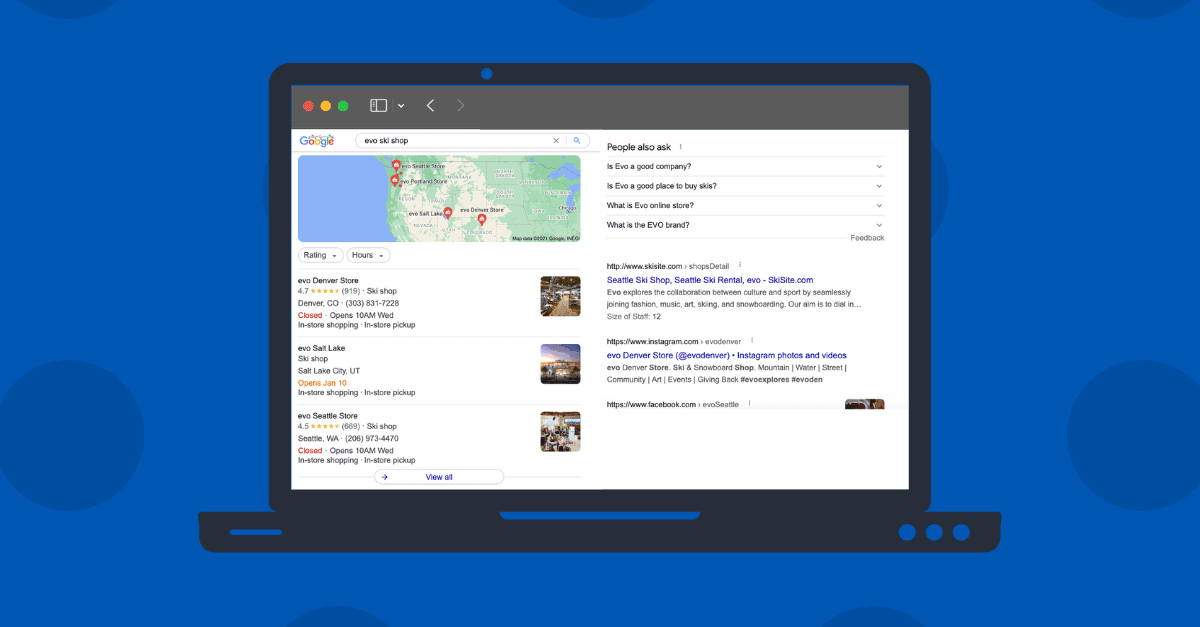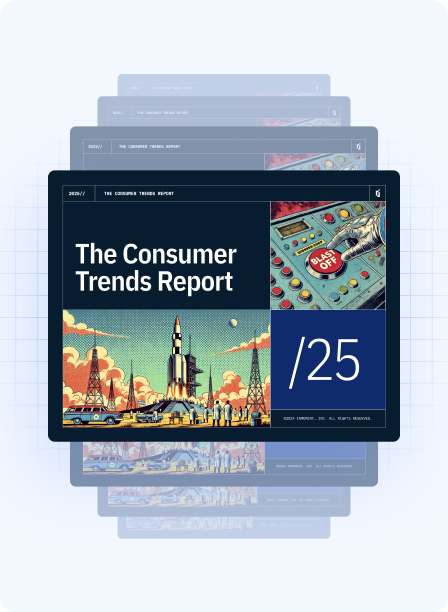7 Best Local Listing Management Software for Supermarkets and Grocery Stores

Local listing management is crucial for any business that relies on local foot traffic. That makes it an essential function for supermarkets and grocery stores, whose revenue is almost entirely local.
But keeping listings accurate and up to date across every possible service, directory, and platform isn’t easy to do. For supermarkets with numerous locations, the job becomes nearly impossible without the right local listing management software.
What Is Local Listing Management Software?
Local listing management software is a tool that helps businesses manage their online information (name, address, phone number, and other key details) across multiple directories and platforms.
It’s an ideal solution for keeping listings consistent and accurate across all the online channels where customers may search for a local physical store. These tools are especially useful for multi-location businesses that need to maintain and update separate pages for each location.
Local Listing Management for Supermarkets vs. Other Businesses
Supermarkets and grocery stores can benefit greatly from local listing management software, as this industry deals with some unique complexities and challenges like:
- Frequent updates to business information: Hours of operation may change with some frequency (holidays, inclement weather), and consumers want confidence the supermarket will be open before they make the trip.
- Real-time inventory and product listings: Supermarkets have massive inventories with thousands of SKUs (the 2023 average was 31,704 unique items). Keeping this information up to date is a huge task.
- Promotions and deals integration: Showcasing deals and promotions in local listings can be a big boost to foot traffic, but watch out for a backlash if these fall out of date.
Why Supermarket Businesses Should Use Local Listing Management Software
Despite the complexities of managing local listings in the grocery industry, supermarkets stand to benefit significantly from using local listing management software. The key is to choose a software platform that understands and effectively solves these industry challenges.
Here are some ways supermarkets benefit from local listing management software:
Boosting Visibility in Local Search Results
First up, local listing management software is the most efficient way to improve a physical store’s visibility in local search.
Local business listings are a significant part of optimizing for local search, also called local SEO. The more accurate and consistent these listings are, the better they look to the search engines, which tends to improve rankings in search engine results pages (SERPs).
This is especially important for supermarkets. In the broader retail industry, some stores and brands rely on local traffic more than others. But for supermarkets, local traffic is pretty much the only traffic! Boosting visibility in local search (including Google and Apple Maps) enables customers searching in a specific geographic area to find your store.
Managing Multiple Locations Efficiently
For supermarket businesses with multiple locations, the challenges of manually managing local listings grow exponentially. Every single change must be made to each listing for every physical location.
A local business listing management solution streamlines all of this, allowing you to batch update similar information across multiple stores. This is a great way to save time and reduce errors when updating any information that’s similar for all locations.
Enhancing Customer Trust
If a customer (or prospective customer) is taking the time to look up your local listing, it’s because they want to know something before heading to your store. If the information they’re seeking is presented consistently and accurately, you’ll build confidence, trust, and loyalty.
That’s the positive news, but we need to look at the negative too, because plenty can go wrong here. If that potential customer lands on a listing that’s talking about a holiday from six months ago or features a phone number or URL that doesn’t work, it doesn’t inspire confidence.
Worse, if they see incorrect information and take action based on it, the negative experience (e.g., driving across town only to find the supermarket doors locked) can damage your brand’s reputation and even sever a customer relationship.
In other words, your local listings can either build or destroy trust—local listing management software helps you tilt the scale toward building trust.
Increasing Foot Traffic and Driving Sales
Improving local listings means better search visibility and stronger customer trust, and both of these support the ultimate goal of getting more people into your stores and selling more products to them. After all, locals can’t become customers if they don’t know you exist.
Best Local Listing Management Services for Supermarkets and Grocery Stores
There are dozens of listing management services available, but not every option out there is a good fit for supermarkets and grocery stores. The seven reviewed below are top contenders in the grocery niche.
1. InMoment
InMoment is a full-service integrated customer experience (CX) platform designed for the needs of multi-location businesses, including supermarkets of all sizes—all the way up to enterprise scale. InMoment’s Integrated CX suite has everything you need, including listings management, competitor analysis, reputation management, and more.
With InMoment, supermarkets can keep business listings full of accurate information and stay consistent across the entire web. The platform also provides the best of both worlds in terms of automation vs. control. Updates can push automatically to any and all listings, or brands can keep granular control, fine-tuning listing updates at the directory level.
Rich ROI-focused data insights, keyword tracking, and powerful connections to other InMoment tools round out this powerful platform that drives results.
Learn more about InMoment’s local listing management capabilities.
Key Features
- Unique map ranking view: See where you rank against the competition on the map.
- Auto-fix information: Identify out-of-sync information and automatically fix those inconsistencies.
- Robust ROI-centric analytics: Learn from your Google listings and Google Maps performance with metrics that stay focused on what matters most: ROI.
- Keyword rank tracking: Identify how you’re ranking vs. the competition on specified keywords, then track progress over time.
- Real-time automatic push changes: Change business hours, add photos, and more, then automatically push those changes to all relevant listings.
- Granular directory-level control: Gain full control at the directory level, auto-publishing information as unique as you need it to be for each directory.
2. Yext
Yext focuses on automated listing management, and its thorough citation network helps supermarkets build search authority. With Yext, businesses pay per listing service, enabling an a la carte approach where a business can choose to focus on Google Business, Yelp, Bing, Apple Maps, or a hundred other services—whichever best supports their goals.
Yext is big on AI, with AI insights, an AI-powered Listings Recommendations tool, and AI-search compatibility (meaning generative results on Google and elsewhere can find and pull from your local listings).
Key Features
- AI-search: Google Gemini and other AI search tools can read and understand Yext-made listings.
- Full automation: Listing management is 100% automated, saving time but limiting your ability to manually intervene.
- Listings Recommendations: AI-powered suggestions based on current performance.
- Data cleansing/duplicate prevention: Avoid headaches associated with duplicate listings and old data hanging around.
3. Moz Local
Moz is one of the longest-standing and biggest names in SEO strategy, and Moz Local is the company’s set of local SEO tools, which includes listing management.
Moz Local centralizes listing management, allowing supermarkets to update business information once and then push that update to more than 70 listing destinations (including online directories, search engines, social media platforms, and more). Like Yext, Moz Local includes tools for identifying and removing duplicate listings, and it will help you refine existing listings so they perform better.
Moz Local works in the U.S., Canada, and the U.K., making it an ideal choice for businesses with a presence in multiple countries. Like InMoment, Moz Local enables supermarkets to monitor and interact with reviews and publish Google Posts updates—but only at the higher price tiers.
Key Features
- Familiar Moz interface: Businesses already using Moz can quickly adapt to Moz Local.
- Search Visibility Score: Moz Local continually monitors search visibility and updates businesses with an easy-to-read score.
- Data-rich reporting and insights: Moz Local’s robust insights outperform many others.
4. Whitespark
Whitespark is a little different from the listing management tools reviewed thus far. It’s a local search service with a big focus on local citations, which are separate instances of name, address, and phone number (collectively known as NAP) across the web. It also allows businesses to manage Google Business Profiles centrally, and you’ll find other tools like review collection and management and local rank tracking.
But what sets Whitespark apart is that it isn’t automated in the way Yext and Moz Local are. Working with Whitespark means working with (and, yes, waiting on) a real team of humans who intelligently refine your listings and help you improve.
You also own your listings, which means they don’t disappear when you cancel your subscription. So Whitespark is a good choice for businesses that want a more hands-on approach.
Key Features
- Local Citation Finder: Build a better network of local citations.
- Local Platform: It’s a powerful way to manage Google Business Profiles, including rejecting unwanted automatic updates.
- Listings service: Enjoy a hands-on, nearly bespoke refresh of your business listings.
5. Brightlocal
Brightlocal is a popular and affordable solution for listing management built around three primary tools: Citation Builder, Active Sync, and GBP Post Scheduler.
Like Whitespark, Brightlocal uses a one-time payment structure for building citations and gives businesses ownership of their listings. The other tools (Active Sync and the post scheduler) do carry a monthly cost, but many businesses find BrightLocal to be the most affordable option for the services it provides.
You’ll have to sacrifice some features for cost savings though, as analytics, listing recommendations, and AI capabilities aren’t available here.
Key Features
- Citation Builder: Build and manage a network of local citations and remove inaccurate information.
- Active Sync: Centralize business listing management and sync changes across multiple sites and services.
- GBP Post Scheduler: Create, schedule, and post Google Posts to one or more Google Business Profiles simultaneously.
6. Uberall
Uberall is another AI-powered and mostly automated solution, but this platform is designed specifically for multi-location businesses (like restaurant franchises and national brands). The tools may feel geared toward restaurants and banks more than supermarkets, but if you’re a leader at a supermarket chain of any size, then Uberall may be worth a closer look.
The platform helps protect against suggested edits in Google Business Profiles, runs duplication checks, delivers performance insights, and offers suggestions for improving listings—all geared toward businesses with multiple locations. Bulk changes to listings can be extremely helpful, though some businesses may chafe at the lack of customization or flexibility.
Key Features
- Automated review response: Create prebuilt answers and let Uberall handle the rest.
- Voice assistant integration: Uberall connects to Alexa and others, giving brands greater exposure to audiences using these devices and services.
- Bulk GBP management: Make adjustments to multiple local listings simultaneously.
7. Birdeye
Birdeye is much more than just local listing management software. Its primary features revolve around social media management and online reputation management (both powered by AI). Local listing management is a complementary tool, but it works well.
Birdeye takes a heavily automated approach to creating and maintaining listings on all major platforms and in many industry-specific directories. Other notable capabilities include image uploads, appointment request links, and a deep scan tool that puts your listings up against relevant benchmarks in your industry.
Key Features
- Automated listings management: Create listings at scale with generative AI.
- Reputation management: Automatically respond to reviews across multiple platforms.
- Social media management: Create and schedule social media posts from a central interface.
Manage Your Local Businesses and Drive Revenue With InMoment
Supermarkets face unique barriers when it comes to managing their local listings, so they need a uniquely powerful solution that equips them to solve those challenges, thrive, and scale.
InMoment combines powerful listings automation, granular control, stellar visibility, ROI-focused analytics, and much more into a feature-packed solution. And for brands that need additional reputation management capabilities and a fully integrated CX, InMoment delivers it all through one comprehensive, intuitive platform.
It’s time to see what InMoment can do for your supermarket brand: Schedule your free demo now.



